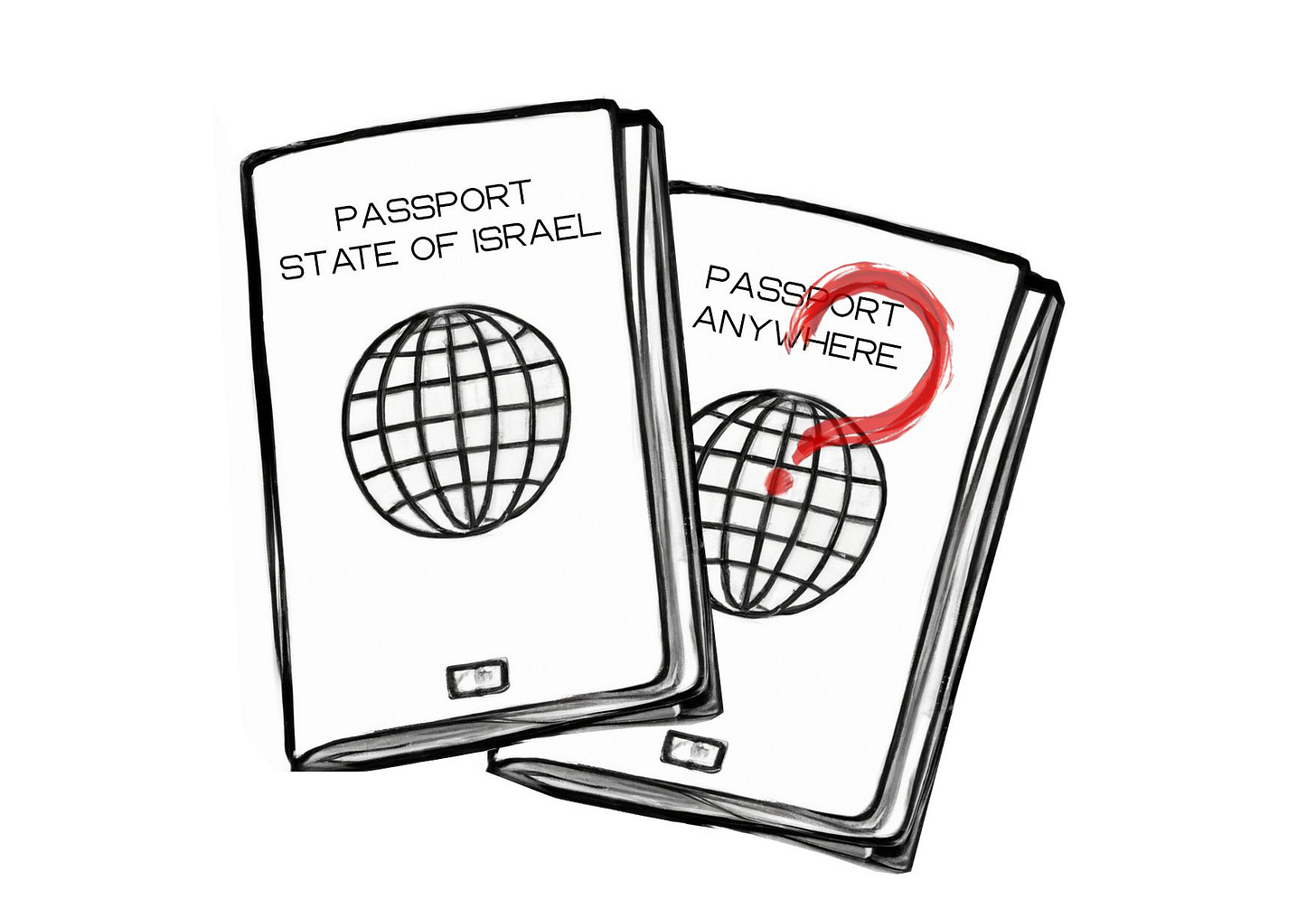No Further: Israel at the Edge
Vivian Bercovici lays out the case for why Israel is at the most critical turning point in its 75-year history and needs to choose the right path
Moments after polls closed on November 1, Israelis learned that the outcome of the fifth election in three years was decisive. Very. Even with slight tweaks in final numbers, the so-called “right-wing bloc” had a clear path to power, effectively obliterating the fractious opposition parties. The latter carried 48% of the popular vote, but they were fraught with infighting; unable even now to mount a strong, unified threat to the surging right.
I have maintained for months – in the runup and the aftermath – that this election was the most important since the state was founded, as it would determine the future of Israel: a robust, liberal democracy? Or a variation on extremist-thug-meets-theocracy-lite? What has taken 75 years to build may be dismantled in a very short time. The motivation and background for this alarming development is explored and explained in the following report.
Israelis are very, very worried. Many are in a “wait and see” mode. But the “deals” being made by Prime Minister-elect Benjamin Netanyahu in order to ensure that his coalition “works” are unconscionable. Repugnant. He is acceding to extortionate demands from his “partners,” who have rightly perceived his weakness and proven themselves adept at exploiting the moment.
There is an expression in Hebrew: עד כאן. The literal translation is “until here.” No further.
“No further” has become a rallying cry.
In the last few decades, many Israelis have very determinedly taken advantage of opportunities in recent decades to obtain a second passport, usually in European countries where their families originated. “Just in case.” You never know. Why not.
Today. They are seriously thinking of using them. As a way out.
In this nation comprised of exiles ingathered, the sense of imminent displacement is embedded deeply in the collective DNA. But that is not why so many are grabbing second nationalities.
People are fed up. With ultra-Orthodox arrogance and power. With the ongoing Likud-led assault on democratic institutions. With the forked-tongue approach of the PM-elect: saying one thing to the foreign English language press and doing quite another in Israel. People are fed up with sending their children off to do military or national service and support a burgeoning Haredi population that steadfastly gives the state the middle finger: refusing to serve while demanding – and receiving – impossibly generous taxpayer-funded financial support. For housing. Dental care. Mundane family expenses. Transportation. Everything.
People are fed up with 12% of the population of Israel – the Haredi cohort – controlling who may marry or divorce, the “purity” of Jewishness, the legitimacy of less stringent denominations of Judaism, monopoly over all matters of religion and state – which hands them a very lucrative pot of money to use to reward friends. Like “supervisors” of kashrut standards in restaurants and hotels. Long known to be a cesspool of corruption. Yet the Haredim have been gifted a state-sanctioned monopoly over this and so much more.
Israelis are fed up with extreme religious nationalists like Itamar Ben Gvir and Bezalel Smotrich being given the tools and latitude to promote their often violent hate-mongering, now legitimized with the imprimatur of the state.
They are fed up with core state institutions – like the Israeli Supreme Court and law enforcement infrastructure – whatever their shortcomings – being vilified and undermined by elected officials. Reform in these areas is badly needed but authoritarianism is not the way preferred by liberal democrats.
Many Israelis are deeply pained by what they see as being the destruction of Israel from within; the trampling of the principles of liberal democracy, by degree, as the country veers into an environment controlled by religious and cultural extremists who openly value Jewish religious law above all.
To some, it may seem sudden, this cluster of madness. But it has been building, for decades; death by a thousand cuts which, suddenly, has become a mortal wound. Society has shifted, in teeny increments, along a continuum, and has awakened long past the tipping point.
Never before has there been such sustained gloom following an election. Never before have so many, so openly, talked of leaving. Relocating. And they are not doing so lightly. Nor are they easily stereotyped.
They are secular, traditional, Modern Orthodox. They are many and varied. They tend to be educated, mobile professionally and committed democrats. People are in a “wait and see” mode. But passivity is no longer a solution. The macro and micro economies cannot sustain the financial and broad political demands made by Haredim. They cannot and the people decidedly will not. Enough. עד כאן
Infighting has destroyed Jewish nationhood before and we cannot be complacent or arrogant enough to think that it will not repeat.
I write this as a former lawyer, diplomat, lifelong student of history and politics, secular Jewish woman living in Tel Aviv, columnist, writer, entrepreneur. I write this as the daughter of a Holocaust survivor and descendant of so many who fled extreme persecution for more peaceful lives. And I write this to give voice to the sacrifice of those who built this magnificent country based on the ideals of equality and liberalism. More than anything, I write this with profound and boundless regret, sadness and rage.
Yes. It is that bad. And it is that serious.
I. BEGINNING OF SOMETHING BAD
In a marathon overnight Knesset session last Tuesday, four new laws were rammed through a preliminary reading by a majority of the newly elected MKs; a required first step in the parliamentary process leading to final passage.
Typically, laws like these – which entrench major changes in power structures and accountability of key state institutions – are subject to months of review: committee hearings, public consultations, review by public service professionals. But not so in this case. PM-elect Benjamin Netanyahu was in a big hurry.
During the day-long opposition-led filibuster leading up to the overnight sitting, Netanyahu took to the dais. In a mocking tone, he assured the Opposition that, in spite of their apocalyptic scenarios, Israel will not become a halachic state. He smirked, dismissively, treating all the huffing and puffing as just that: theatrics with no substance.
Netanyahu’s Likud party has traditionally been a big, accommodating, center-right tent in which all – secular, traditional and orthodox – are well-represented and respected. In the last five years or so it has degenerated into a low-end bar crowd. Most of the more thoughtful, Likudniks decamped in stages over the last four to five years – most prominently, former minister of defence and IDF chief of staff, Moshe (“Bogey”) Ya’alon and former cabinet minister, Gideon Sa’ar. Why people like the highly regarded Yuli Edelstein and Nir Barkat have not defected, tying their integrity to a party so profoundly compromised, is a mystery.
In recent years, Netanyahu’s ever-acrimonious relationship with Israeli media has devolved into full on nuclear war. He blames the media and various “deep state” interests for planting baseless stories about him and his family which, ultimately, led to him being indicted in November 2019 on multiple corruption-related charges. His trial has been ongoing since May 2020, which is one of many bizarre anomalies of the Israeli justice system. In most western democracies, trials begin and continue uninterrupted until a verdict is reached. In Israel the hearing may convene, then adjourn for months, then resume and continue in this haphazard manner. In Bibi’s case, this erraticism serves his political and personal interests.
(As an aside, when various Haredi and Likud cabinet ministers and politicians have been investigated, with some being charged and tried, I do not recall them wailing about the absurdly inefficient criminal justice system that often resulted in them walking or pleading to much lesser offences due to the passage of time.)
Many Likud supporters are convinced that Bibi has been framed and persecuted by nefarious interests and are convinced that there is no evidentiary basis for the whole legal circus. Let’s assume they are right. So what?
Whether the charges are well-founded or not, the fact is, every political decision Netanyahu has made for the last five years has been determined almost solely by self-interest. Whatever will hasten the shutdown of his trial is a priority. (For years, I resisted this conclusion as being too facile and blindly partisan. But over time. Sadly, I have come to see it as true.) In order to effect this he must be in power. And to be in power he must accept the bedfellows that provenance has delivered. And he has done just that.

II. A FLURRY OF NEW LAWS: WHY?
As of Wednesday morning, four new laws were passed by the Knesset plenum which have since reportedly been consolidated into three. They were then rammed through rather raucous committee hearings that same day so that they could blast through the required democratic processes and become law within days. Without these sweeping legal changes – which call into question the ethical values of this government – the new Cabinet cannot be sworn in. And because no one trusts Bibi to do what he promises his “partners” are demanding that the laws be changed before the Cabinet is sworn in. Otherwise, they clearly believe he will renege on his commitments.
Since the pre-shabbat assault on parliament, though, there have been some skids. With each passing day, it seems, the intensity of resistance from the broadest range of Israelis – including diehard Likudniks – gains momentum and weakens any suggestion that this major reform even reflects a popular consensus.
And then there’s the other rub. These laws are required because many of the terms of the Cabinet mandates negotiated by Netanyahu contravene existing law.
So, what are these big moves that have so many Israelis so apoplectic?
1) The “Ben Gvir Law” will make it possible for extreme right-wing “Jewish Power” leader, Itamar Ben Gvir, to be appointed National Security minister, a turbo-charged version of the former and long-standing position of Public Security minister. Top cop in the land. Ben Gvir demanded, and received, additional powers to decide where and in what numbers law enforcement should be deployed, which is unprecedented. Given Ben Gvir’s provocative conduct over decades, it also causes serious concern.
In a hurried committee session considering the Ben Gvir bill on Wednesday afternoon, Israel’s chief of police – sitting right next to his minister-to-be – warned that the authority that will vest in Ben Gvir will create policing chaos. Lines of authority will be confusing and are being rushed to address political concerns, not policing issues. Particularly in an environment like Israel, which is so complex, coordination of policing must be centralized and carefully calibrated.
As he is wont to do, Ben Gvir waved his arms theatrically and yelled, “Show me where it is written!” Since then, he has been swaggering and saying, basically, that if the Chief of Police does not smarten up that he’ll be fired within days of Ben Gvir being sworn in as minister.
This is not the temperament or experience that instills public confidence. But Ben Gvir owns Bibi and they both know it.
State of Tel AvivVivian Bercovici
State of Tel AvivVivian Bercovici
2) The “Deri Law” will amend the closest thing that Israel has to a constitution – the Basic Laws – which set out the principles that form the foundation of all state governance. Currently, the Basic Laws prohibit any individual who is serving a custodial sentence as a result of a criminal conviction to be appointed to a ministerial position.
Just last February he pleaded guilty to reduced charges (related to corruption) and received a one-year suspended sentence. Netanyahu agreed to amend the relevant Basic Law in order to address Deri’s personal predicament. As Deri is not physically incarcerated, the logic seems to go, he should not be prevented from assuming high office.
Deri is twice convicted on corruption charges and served two years in prison more than 20 years ago.
So, Israel now has a foundational law that states specifically that only a custodial sentence can prevent an MK from serving as a cabinet minister. As a result, Shas leader Aryeh Deri will be rewarded with the Interior and Health portfolios and, in two years, will become minister of Finance.
Whatever transpires, that a man convicted of crimes of moral turpitude, with demonstrated recidivist tendencies, will even be considered for such a position, is deeply offensive. Nevermind undemocratic.

Furthermore, when Deri pleaded to lesser charges and received a suspended sentence last February, he assured the presiding judge that he would neither accept nor seek high public office, like a cabinet position. On the basis of his word – and he is, after all, a senior rabbi as well – the judge granted him leniency.
But. But. Here we are. Seems that Deri either straight up lied to the judge or, on the most charitable interpretation, he was sincere at the time but has since changed his mind. Well. That’s just not how commitments of such a serious nature are treated in a properly functioning democracy. Both he and Bibi seem totally untroubled by the extreme disingenuousness.
State of Tel AvivVivian Bercovici
3) The “Smotrich Law” is being enacted in order to enable Religious Zionism leader, Bezalel Smotrich, to sit as a sort of ancillary minister in the Ministry of Defense. He will have responsibility for all building permits in the West Bank as well as COGAT – the IDF unit that is responsible for all civilian coordination with the Palestinian Authority. It is a hugely important job that requires intense cooperation with the IDF command.
This, of course, is in addition to his role as Minister of Finance. As a hard-right advocate of West Bank settlement, Smotrich is expected to manage the delicate defense turf with a heavy hand. Criticism has been vociferous and swift, most importantly and, I believe, unprecedentedly, from the current IDF chief of staff, Aviv Kochavi. Speaking last week when the rumors of Smotrich’s elevation first circulated, Kochavi slammed the possibility.

In fairness, Kochavi was also reacting to an incident that took place several weeks ago. Israeli activists were protesting in Hebron, a West Bank hotspot where tensions are unceasingly stratospheric. Not for the first time, IDF soldiers were physically and verbally abusive but this time the incident was recorded, as was a combat soldier taunting the person holding the phone.
“Ben Gvir will sort things out here,” he said on camera, smiling glibly. “You lost. The fun is over”
Sentenced to ten days in military prison for violating a slew of IDF standards and rules, the soldier’s conduct was praised by Ben Gvir, who said that the protesters had been spitting and yelling at soldiers before they intervened and made the self-incriminating recording. Demonstrators who were present dispute the soldier’s claim.
According to the bellicose soon-to-be Top Cop, Ben Gvir, the soldier did nothing wrong. His supporters doxed and harassed the Lt. Col. who sentenced the lad to military prison.
Into this mess stepped IDF Chief of Staff Aviv Kochavi. In a searing public rebuke of Ben Gvir – and, by association, Smotrich – Kochavi let loose. “We will allow no politician, from the right or the left, to interfere in command decisions.” He continued to warn that chipping away at IDF independence is a slippery slope to be avoided.
I would add to his tempered comments that politicians intervening in military and police conduct, as Ben Gvir and Smotrich aspire to, is antithetical to democratic norms and principles.
Ben Gvir shot back that Kochavi should also refrain from making political statements, incurring the wrath of even his “right-wing bloc” allies.
Again, Netanyahu was tight-lipped. His belated statement did nothing to quell the controversy or put Ben Gvir in his place. He can’t do that.
So, on Twitter, he opted for a milquetoast, equivocal statement, that implored everyone to leave the IDF out of political debate.
It was clear who had power and how they intended to use it. Netanyahu’s vague, smooth assurances that the IDF would always manage Israeli security was akin to saying nothing. Weak. Non-specific. Uncritical of Ben Gvir or Smotrich.
4) As for the ultra-Orthodox Haredi United Torah Judaism party, there is plenty of wheeling and dealing afoot, but nothing that seems to require urgent legal reform. Among their never-ending list of increasingly outrageous demands is that there be no electricity generation on the Sabbath (presumably a surplus would be stored for weekend consumption), increased financial support for Haredi men who choose to full-time religious study over working to support their large families, a ban on egalitarian prayer at the Western Wall Plaza and reform of the Law of Return to permit only halachically confirmed or converted Jews to immigrate to Israel. They have stood firm on their insistence that there be no effort to draft Haredim into the IDF, with UTJ leader Moshe Gafni quipping recently: “If everyone else (secular and traditional Israelis) goes to study Torah then we (the Haredim) will serve in the army.”
It's a big joke to him. Prayer, he affirms, will ensure safety and security in Israel. Not military prowess.
Perhaps they keep tossing out provocative comments – like the one about electricity on Shabbat – in order to distract from much more significant concessions that they are negotiating quietly.
The more they receive the more they expect. They see themselves as the only “true” Jews, serving the highest purpose and power, whereas as we, the others, exist to minister to their demands.

Aside from Likud, every party represented in this coalition is dismissive of all non-Orthodox denominations, sanctioning a decidedly narrow view as to what sort of Jewish practice is legitimate. They have already alienated a sizeable chunk of the Diaspora communities and could not care less. This grab bag of zealots will not be deterred from fulfilling their holy missions. Not by Bibi. Not by anyone.
There is a dizzying range of detail overlooked in this summary, but one nugget worth mentioning is the appointment of the virulently anti-LGBTQ Noam party leader, Avi Maoz ,to the position of Minister with Responsibility for Jewish Identity.
In addition to his coarse views and language over years, Maoz is also a staunch defender of a leading rabbi in Maoz’s religious community. This spiritual leader has recently been accused of multiple sexual assaults of young women over decades. Maoz has shown no concern for the well-being of the women. Quite the opposite, in fact.
This man has also been given authority over all external programming managed by the Department of Education, a relatively small ($200-million) spend for a huge ministry but disturbing, nevertheless.

This is just a taste of what has been really going on and has Israelis reeling. The whole stinking mess. There is only so much lipstick one can put on a pig.
This government is corrupt and highly illiberal. Extremist agendas are being promoted in order to save the skin of the PM-elect, who dismisses the profound concerns of Israelis with contempt.
III. EXHIBIT “A”: THE WRONG KIND OF INFLUENCE
Since the election, Netanyhau has studiously avoided Israeli journalists but made himself very available to carefully curated independent foreign media. He likes control and clearly felt he could manage them more adroitly. Using the promotion of his recently published – and excellent – autobiography, he generously set aside hours for these outlets, in the midst of coalition negotiations, while shunning Israeli media.
In addition to controlling his message, these lengthy chats allowed him to speak directly in his brilliant English, to an American audience, an asset and advantage he has always maximized. Having US public and political opinion onside is not only an existential concern for Israel but seems to be a key element of Netanyahu’s psyche, to connect and resonate with and receive approval from Americans and America.
Had he submitted to such lengthy talks with the Israeli press he would have been shredded. It is clear that parameters were set in advance, because no interviewer would forget to ask him about the influence of his ongoing criminal trial on his political decision making. So, he just skated over that.
In English, he reassures that the Ministry of Defense will be strongly managed by Likud, making clear that he will, wink wink, really be the one running the show. He sloughs off any concern about Ben Gvir or Smotrich. As if.
In English, he dismisses any notion of religious law and standards blurring the already fuzzy lines separating religion and state. And he asserts with earnestness his commitment to equality for LGBTQ.
But, no interviewer presses Netanyahu on Avi Maoz. Moshe Gafni. Aryeh Deri. Itamar Ben Gvir. Bezalel Smotrich. And what he has promised to them. The way he has contorted the democratic process. Because the two realities are utterly incompatible; what he says in English and what is happening in Israel.
Everything was ducky until the New York Times seared Netanyahu in an op-ed published on Saturday. Careful to remind readers, at the top, that the editorial board has been a consistent supporter of Israel and a two-state solution (a debatable statement best left to another time) the board lashed the new coalition for a raft of by now familiar reasons. And that critique stoked Bibi’s ire.
In a short, biting twitter thread, he hit back late on Sunday, Israel time, questioning the veracity of any claim of NYT support for Israel and, in many ways, I quite agree with him, historically. But not today.
What is, perhaps, most notable about this is that the PM-elect of Israel engages so vigorously with foreign media, again, ignoring that which serves his base, the people of Israel. Whoever is giving him comms advice may wish to rethink that bit.
Then there is the “Alan Dershowitz Episode.” The celebrity American lawyer was highly critical several years ago of the legal proceedings initiated against Bibi, deeming them to have been trumped up and petty. So he’s a solid Bibi man.
But, recently Dershowitz has been breathing fire about a key aspiration of Likud and its allies – the evisceration of the Israeli Supreme Court. The “right-wing bloc” has been warning for months that it will pass a law enabling the legislature to override – effectively negate and ignore – any High Court ruling that purports to modify or strike down Knesset laws. This referred to as the “override clause.”
Put plainly, if implemented, the Israeli Supreme Court would be defanged and the Knesset would stand as the single and supreme governing body, with no checks or balances. Kind of like being cop, prosecutor and judge.
It would, as a practical matter, endow the majority of the legislature to determine all legal matters with finality. Even in a well-functioning democracy, the notion that the “majority rules,” no matter the issue, is considered to be extreme. This is precisely why there are usually layers of scrutiny before significant changes are made to laws.
Unlike most democracies, Israel does not have an upper chamber – like a Senate – to provide sober second reflection and comment on new laws or amendments. The only potential restraint on the legislature is the High Court. And Bibi has been burning to sweep it aside and asunder.
That was, of course, until Dershowitz went ballistic. Apparently, behind closed doors, Netanyahu has cooled on the whole override clause thing.
If true, then this whole scenario could turn out to be Netanyahu at his wiliest yet.
IV. A “WHAT IF” SCENARIO WHICH IS CLASSIC BIBI
Should the Deri, Smotrich and Ben Gvir laws make it through the Knesset, it is a foregone conclusion that multiple interests – civil society organizations, professional associations, opposition parties, individuals and more – will appeal to the Israeli Supreme Court. And they will be heard. In addition to the substantive mess these laws will create, the manner in which they are being rammed through the Knesset is very low-end democratic.
In several discussions last week on what seem to be rather extreme procedural liberties taken by Netanyahu to get this government formed, Dr. Assaf Shapira, Director of the Political Reform Program at the Israel Democracy Institute, was understated but fierce in his critique, saying that this raft of laws is unprecedented and in essence not at all aligned with a democratic sensibility.
Shapira also pointed out that the Supreme Court would very likely send the laws back to the Knesset in order that they may be properly debated and scrutinized in the plenary and committees. As I learned in several decades of law practice, form, at a certain point, becomes substance. The discipline of allowing an exhaustive review of proposed legislation prior to enactment is a core and critical distinguishing factor of a democracy from more autocratic forms of government.
Should the Supreme Court send the laws back to undergo appropriate consideration, it would be a lengthy process. And it would likely mean that the most controversial aspects of the spate of new “laws” would not be implemented for some time, if ever.
Drawing by Igor Tepikin
But that is beside the point. That Netanyahu would even go so far as to rehabilitate such extreme, unethical MKs to lead the nation is so far beyond the pale. Beyond rancid. Israelis do not need the New York Times to tell them that this is all so, so wrong.
V. THE HOLE JUST GETS DEEPER: LOOKING BACK
In the immediate aftermath of the November 1 election, Israel’s fifth in three years, Bibi and his “right-wing” allies were euphoric. They had trounced the heathen “change government,” which they considered to be a mess of leftists and Arabs. They rejoiced. Itamar Ben Gvir, a supernova among the new class of political stars in Israel, said it best: “We are now the landlord in our home.”
Yes, Bibi won, in a way. But he had no leverage with his “allies.” They had him over a barrel and they knew it. Bibi owed them his hide and they were bloody well going to have it. Early consensus was that Bibi would stitch up a coalition in days and get down to the business of governing. I never thought that would transpire – and it didn’t. Bibi’s out of tricks.
Treating this Likud-led government as being “right-wing” is a complete misnomer. Likud has become a shadow of itself, ideologically, devoted solely to staying in power so that Bibi can shut down his trial on multiple corruption charges. Their ultra-Orthodox Haredi and Religious Zionist coalition partners are extremists whose only economic platform is an impressive and increasing list of demands it makes of the state – and shall now receive.
For those not immersed in political life in Israel, the machinations must seem endless and exhausting. They are. But, this time is different. It’s not “same old.” This time, even the most hardened, committed Israelis, who have always waved off the latest crisis as “שטויות” – nonsense – that will pass, are not at all cavalier.
As details of the deals being made were learned last week by the Israeli public, backlash was fast and fierce. The Attorney General, senior public servants in the Ministry of Justice, legal scholars, business leaders, tech and innovation figures, the current IDF chief of staff and some of his predecessors, individuals with a plurality of political leanings, Alan Dershowitz and no doubt countless others more privately, raised their voices. And said. No further.
There is widespread alarm over what may well be a dangerous and irreversible turning point for this young nation.
VI: THE HOLE IS BOTTOMLESS: LOOKING FORWARD
As the coalition negotiations dragged on over the last month it became clearer by the day that Likud’s coalition partners were going to extract big concessions from Netanyahu. In the days leading up to the expiry of his 28-day term in which to negotiate terms for a governing coalition, Netanyahu realized he would not meet the deadline.
So, ten days ago, Prime Minister-elect Benjamin Netanyahu sent a letter to President Isaac Herzog.
He requested an additional 14 days to finalize terms with his coalition partners in the most extreme government ever to preside over Israel. Bibi’s particular quandary is that in order to implement his complex arrangements, enabling legislation must be passed into law. Urgently.
Which tells you a lot. As discussed above, without significant changes to Israeli law, the terms of the incoming coalition, as negotiated, would, effectively, be illegal. That is how extreme this new coalition will be.
In his written response to Netanyahu, Herzog acceded to an additional ten days, without explanation. He also directed Netanyahu to ensure that this government represents and serves all Israelis, a strongly worded rebuke from a president, whose position as head of state, requires neutrality.
Requests for extensions are commonly made of the president in such situations and historically virtually all have been granted. For reasons that are unclear, then-President Reuven Rivlin allowed Benny Gantz to extend his time by only 48 hours. But here, President Herzog had an opportunity to refuse Netanyahu’s request. He chose not to.
The legislative changes being made by the PM-elect are so extreme as to call into question their legitimacy. His incursions into IDF authority over national security have top security officials united in outrage. His bespoke “Deri Law” is clearly drafted to address the soon-to-be minister’s criminal recidivism. Netanyahu is bending over backwards to accede to the demands of a minister twice convicted. Twenty-two years ago, Deri went down on crimes of moral turpitude. He served two years in prison. Because he pleaded to lesser offences last February, the more recent convictions do not have that taint but are thought to be substantively similar. Both sets of offences were committed while he was sitting as Minister of Interior.
And he will be back in that chair, as well as Minister of Health, and in two years Minister of Finance. This makes a mockery of any semblance of serious governance, ethics or moral standards. It is the kind of gutter conduct one expects of juntas and banana republics. These certainly are not the hallmarks of a maturing, serious, liberal democracy.
This is why so many Israelis are furious. And this is neither frivolous nor fleeting. No one can afford to look away.
עד כאן
No further.








